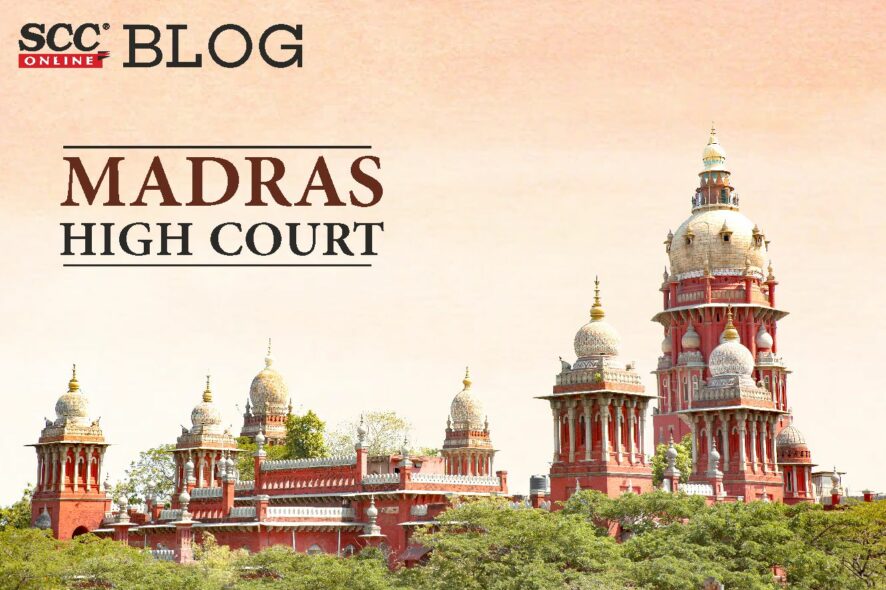Madras High Court: In a case related to an appeal filed for the cancellation of an order of dismissing the bail application by the Special Court under the National Investigation Agency Act (Sessions Court for Exclusive Trial of Bomb Blast Cases) (Special Court), S.Vaidyanathan and A.D. Jagadish Chandira, JJ. released the appellant on bail on executing a bond for a sum of Rs.25,000/ with two sureties and directed the Special Court to proceed further with the trial on a day-to-day basis.
The present case was registered under Ss. 16, 17, 18 and 20 of Unlawful Activities (Prevention) Act, (UAPA),1967 and Ss. 120-B, 34, 124-A and 489-C Indian Penal Code, 1860(‘IPC’) against the appellant and other accused for offences related to a threat emerging from a live conspiracy to smuggle explosives and terrorists into India from Sri Lanka and execute bomb attacks at the US Consulate in Chennai, Israel Consulate in Bangalore, other vital installations and places of public congregation in Southern India. The other accused persons were convicted. However, during the investigation, the appellant was found to be a habitual trafficker of high-quality counterfeit Indian currency notes, he was enlarged on statutory bail by the Special Court, while so, since the appellant did not turn up before the Special Court for the hearing of the case, summons were issued on various dates, and since he did not turn up even for that, the Court had issued a non bailable warrant of arrest against him.
Meanwhile, he was arrested by the Chennai Police under Section 392 IPC, and while he was in prison, he was produced before the Special Court and was remanded under Section 309 CrPC.and the trial as on date is pending for framing of charges against the appellant.
After that the appellant filed for bail and the same was dismissed by the Special Court invoking Section 43D (5) of the UAPA finding “prima facie” case as against the appellant, which lead to the present appeal.
The Court noted that the appellant had been granted statutory bail and it wasn’t cancelled. However, the Special Court had remanded the appellant under Section 309 CrPC., and by referring to the ruling in Raghubir Singh v. State of Bihar (1986) 4 SCC 481, wherein the Court held that S. 309(2) merely enables the court to “remand the accused if in custody” and it does not empower the court to remand the accused if he is on bail. It does not enable the court to “cancel bail” as it were, and that can only be done under Section 437(5) and Section 439(2).
The Court observed that “the appellant stands on a different footing than the other accused persons, who have been found guilty and convicted. Further, even though the delay in conducting the trial may be attributed to the appellant prior to his arrest, he is not responsible for the delay after his arrest and that he has been in prison for almost a year without there being any progress in trial and that in toto he had been in prison for more than 4 years.”
The Court also took note of the ruling in Union of India v. K.A. Najeeb (2021) 3 SCC 713, wherein, the Court held that the presence of statutory restrictions like Section 43-D (5) of the UAPA per se does not oust the ability of the constitutional courts to grant bail on grounds of violation of Part III of the Constitution, and both can be harmonised. Such an approach would safeguard against the possibility of provisions like Section 43-D (5) of the UAPA being used as the sole metric for denial of bail or for wholesale breach of constitutional right to speedy trial. The courts are expected to appreciate the legislative policy against grant of bail but the rigors of such provisions will melt down where there is no likelihood of trial being completed within a reasonable time and the period of incarceration already undergone has exceeded a substantial part of the prescribed sentence. Further in Asim Kumar Haranath v. National Investigation Agency (2021) SCC OnLine SC 1156, it was held that while deprivation of personal liberty for some period may not be avoidable, period of deprivation pending trial/appeal cannot be unduly long as timely delivery of justice is part of human rights and denial of speedy justice is a threat to public confidence in the administration of justice.
The Court observed that:
“the law is well settled, that in case where the accused is on bail in non-bailable offence and did not appear on hearing date and non bailable warrant is issued, on appearance of the accused or on his production by police through Prisoner on transit (PT) warrant, opportunity should be given to the accused to explain his non-appearance and decide as to whether to let him off by recalling the warrant or to cancel the bail by recording reasons and he cannot be straightway remanded to judicial custody as a PT warrant can never be converted into a regular warrant in a case where the accused person is already on bail”
It further observed that as the appellant is in custody for more than a year without any progress in trial, and even the gravity of offence against him is comparatively lesser than that of the other convicted accused, the continued detention of the appellant is in violation of his right of personal liberty and the appellant is entitled to grant of bail subject to imposition of certain stringent conditions and directed the Special Court shall proceed further with the trial on a day to day basis in accordance with the guidelines given in Vinod Kumar v. State of Punjab (2015) 3 SCC 220.
[Noorudeen v. State of Tamil Nadu, 2022 SCC OnLine Mad 4223, decided on 26.08.2022]
Advocates who appeared in this case :
R. Sankarasubbu, Advocate, Counsel for the Appellant;
Public Prosecutor R.Karthikeyan, Advocate, Counsel for the Respondent.






